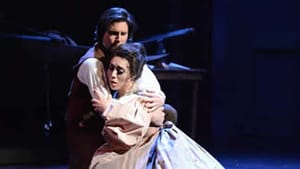Stay in the Loop
BSR publishes on a weekly schedule, with an email newsletter every Wednesday and Thursday morning. There’s no paywall, and subscribing is always free.
Tomorrow's opera stars today
'La Bohème' at AVA

We are happily accustomed to singers trained at Philadelphia’s Academy of Vocal Arts going on to star at the Metropolitan. Ten are currently on the Met roster. But it’s unprecedented that three of the performers in one AVA production competed in this year's internationally respected Metropolitan Opera National Auditions.
Marina Costa-Jackson sang the soprano lead of Mimì in the AVA Bohème. Jared Bybee, baritone, was Marcello the painter. Michael Adams, baritone, was Schaunard the musician. And William Davenport, while not in the Bohème cast, has sung the lead tenor roles in The Tales of Hoffmann and La Traviata at AVA. They were the quartet selected from 1800 singers who competed for such an invitation and a chance to catch the ears of the opera world.
Costa-Jackson has a big voice that’s darker than we usually hear as the ailing Mimì. She was superb two seasons ago as Amelia in Verdi’s Masked Ball, which requires large-scale singing. The ultra-dramatic Birgit Nilsson and Zinka Milanov were famous Amelias, and rarely does one soprano include both Amelia and Mimì in her repertoire. Bybee and Adams both displayed ringing baritone voices, while tenor Dominick Chenes was an ardent Rodolfo.
The production was also notable for the sounds coming from the pit. La Bohème concerns young love and premature death, and in a larger sense is about unfulfilled hope. This becomes clear when you listen to the orchestra. During the Act I love duet, for example, violins and cello accompany Rodolfo while a solo flute, English horn, clarinet, and bassoon play in unison with Mimì and a harp portrays the moon. A series of slow, unresolved chords heighten the feeling of unattainable yearning. You’ll rarely find Puccini compared to Wagner, but this scene has definite similarities to what Wagner did in his Tristan und Isolde.
Pure Puccini
Christofer Macatsoris, in his sixth decade as a conductor, led an unusually youthful and lyrical Bohème. This is entirely appropriate for a story of young Bohemians in a Parisian garret. His conducting also demonstrated awareness of Puccini’s instructions. Many productions of Bohème allow the tenor to belt an unwritten loud high C at the end of Act I as he finishes singing “O soave fanciulla” (“Oh, sweet girl”) to Mimì. Puccini wrote a soft high C at that point for Mimì while the tenor is supposed to harmonize quietly three notes below hers. And some conductors even allow the pair to transpose their duet down a pitch so they can blast high B’s instead of C. Macatsoris would not allow that, of course.
His touch was heard at less obvious places, too, throughout the opera. Macatsoris had orchestra and singers phrase as Puccini instructed rather than suddenly slow down to allow singers to show off or pausing to allow them to grab extra breaths. Puccini knew what he was doing; no composer is more friendly to the human voice, and this production showed that when you follow his score the results are beautiful.
Author's update, March 24:
Of the four AVA students who competed in the Metropolitan Opera National Auditions, two made it to the finals: Jared Bybee and Marina Costa-Jackson. On Sunday, Costa-Jackson, currently in her junior year at AVA, was declared one of the five winners who will each receive a $15,000 prize. While the judges deliberated, Angela Meade — a winner of the 2007 Met auditions — sang two arias. Meade graduated from the Academy of Vocal Arts in 2009 and is now a major artist at the Met. The event will be shown on PBS later this year.
What, When, Where
La Bohème. By Giacomo Puccini. The Academy of Vocal Arts. Christofer Macatsoris conducted; David Gately directed. February 7-19, 2015 at AVA's Helen Corning Warden Theater and at the Haverford School. 215-735-1685 or www.avaopera.com.
National Council Grand Finals Concert. Sunday, March 22, 2015 at 3pm at the Metropolitan Opera, Lincoln Center, New York. 212-362-6000 or www.metopera.org.
Sign up for our newsletter
All of the week's new articles, all in one place. Sign up for the free weekly BSR newsletters, and don't miss a conversation.
 Steve Cohen
Steve Cohen